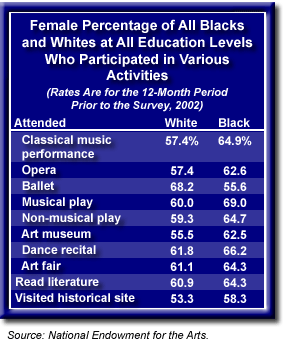Two Flagship State Universities Add Black Studies Majors
 The first black studies departments were established in the late 1960s. There are now several hundred colleges and universities that offer degree programs in the field. Yet they represent only a small fraction of all colleges and universities in the United States. The conventional wisdom is that if universities withstood the pressure to establish a black studies program for 40 years or more, it is doubtful they will now change their positions. The first black studies departments were established in the late 1960s. There are now several hundred colleges and universities that offer degree programs in the field. Yet they represent only a small fraction of all colleges and universities in the United States. The conventional wisdom is that if universities withstood the pressure to establish a black studies program for 40 years or more, it is doubtful they will now change their positions.
 However, the University of Connecticut and the University of Illinois both recently announced that they are establishing an African-American studies major. Beginning next fall, students at both universities will have the opportunity to major in black studies. However, the University of Connecticut and the University of Illinois both recently announced that they are establishing an African-American studies major. Beginning next fall, students at both universities will have the opportunity to major in black studies.

NORTH AMERICAN COUNCIL FOR ONLINE LEARNING (NACOL)

Registration is now open for the Virtual School Symposium (VSS) 2008
The North American Council for Online Learning (NACOL) is pleased to announce that registration is now open for the Virtual School Symposium (VSS) 2008. This year's conference will take place October 26-28, 2008 in Phoenix, Arizona. The VSS theme is: "Bridging the Gap through Online Learning"
The VSS 2008 Program Committee is now accepting proposals for presentations at the conference. The deadline for submitting proposals is March 31, 2008. To download the directions and application, please visit: http://www.virtualschoolsymposium.org/rfp.php or go through NACOL’s website at http://www.nacol.org.
The VSS brings together more than 1200 education leaders from national, state, district, private and other programs together at the industry’s leading event in K-12 online learning. The VSS conference provides important networking opportunities, access to expertise and analysis, trends, research and thought-provoking sessions for leaders looking to help shape the future of education.
Early bird registration discounts are available for a limited time! NACOL members can register by Sept. 15th for only $369.
About NACOL
The North American Council for Online Learning (NACOL), founded in September 2003, is the international K-12 non-profit organization representing the interests of administrators, practitioners and students involved in online learning in the United States, Canada, Mexico, and abroad.NACOL’s mission is to increase educational opportunities and to enhance learning by providing collegial expertise and leadership in the K-12 online teaching and learning marketplace. The association strives to achieve this mission by leading initiatives to conduct research to enhance quality K-12 online learning; encourage collaboration among practitioners in the online learning marketplace; and promote the success and effectiveness of online learning. NACOL offers monthly Teacher Talk Webinars on the third Thursday of each month at 6:00 p.m. (Eastern). Registration available with member and non-member pricing to individuals and institutions.

Four African-American College Students Named Chips Quinn Scholars
This spring 16 college students from across the United States are interning in newsrooms at 14 daily papers under a scholarship program established by the Freedom Forum. The Chips Quinn scholarship program was established to honor the former managing editor of the Poughkeepsie Journal who died in an automobile accident in 1990 at the age of 34. The scholarships, which are reserved for “students of color,” were established by Quinn’s parents who were active in the Freedom Forum.
Four of this spring’s 16 Chips Quinn scholars are black. They are currently spending 10 to 12 weeks as working journalists.
The four aspiring journalists are:
 • Ashlee Clark, a student at Western Kentucky University in Bowling Green. A native of Louisville, she is interning at the Lexington Herald-Leader. • Ashlee Clark, a student at Western Kentucky University in Bowling Green. A native of Louisville, she is interning at the Lexington Herald-Leader.
 • Matthew Cooper from Oakland, California, is a student at Howard University in Washington, D.C. He is working at the Jackson Sun in Tennessee. • Matthew Cooper from Oakland, California, is a student at Howard University in Washington, D.C. He is working at the Jackson Sun in Tennessee.
 • Shawntaye Hopkins is from Lexington, Kentucky. She is a student at Western Kentucky University and is working at the Lexington Herald-Leader. • Shawntaye Hopkins is from Lexington, Kentucky. She is a student at Western Kentucky University and is working at the Lexington Herald-Leader.
 • Rickeena Richards is a native of Kansas City, Missouri. She is a student at St. Louis University and is spending this semester working for the Belleville News-Democrat in Illinois. • Rickeena Richards is a native of Kansas City, Missouri. She is a student at St. Louis University and is spending this semester working for the Belleville News-Democrat in Illinois.
Cleveland Sellers to Step Down as Director of Black Studies at the University of South Carolina
 Forty years ago in 1968, black students at South Carolina State University in Orangeburg mounted a protest at a segregated bowling alley in town. On February 8, students lit a bonfire on campus. When police officers came to campus, one officer was struck in the face with a piece of wood. Officers then opened fire, killing three students and wounding another 27. The incident became known as the Orangeburg Massacre. Forty years ago in 1968, black students at South Carolina State University in Orangeburg mounted a protest at a segregated bowling alley in town. On February 8, students lit a bonfire on campus. When police officers came to campus, one officer was struck in the face with a piece of wood. Officers then opened fire, killing three students and wounding another 27. The incident became known as the Orangeburg Massacre.
Nine police officers faced trial for using excessive force. All were acquitted. The only person jailed as a result of the event was Cleveland Sellers, a black student who had played a role in organizing the demonstration. Sellers was later pardoned, and for the past seven years, he has directed the African-American studies program at the University of South Carolina.
Professor Sellers has announced that this June he will step down as director of the black studies program. He will remain affiliated with the University of South Carolina as a senior scholar-in-residence and a research professor of African-American studies.
Black Scholar Named Ambassador to Nigeria
 Robin Renee Sanders is enrolled in a Ph.D. program at Robert Morris University in Moon Township, Pennsylvania, in the western suburbs of Pittsburgh. But Sanders will be taking some time off from her studies. Recently she was sworn in as U.S. ambassador to Nigeria. Robin Renee Sanders is enrolled in a Ph.D. program at Robert Morris University in Moon Township, Pennsylvania, in the western suburbs of Pittsburgh. But Sanders will be taking some time off from her studies. Recently she was sworn in as U.S. ambassador to Nigeria.
Sanders is a graduate of Hampton University. She holds two master’s degrees from Ohio University, one in international relations and the other in communications and journalism.
Sanders is a career member of the foreign service and has worked in numerous diplomatic posts. She has also worked for the National Security Council under two presidents.

THE STATE UNIVERSITY OF NEW YORK

Call for Paper Proposals, Scholarly Conference
May 15, 2008. Call for Paper Proposals: "SUNY & the Promise of Public Higher Education in America," at SUNY-Albany on April 5 - 7, 2009. The conference will examine SUNY in the context of New York State's political, economic, social, and cultural history, and in comparison to higher education in other states. The conference will also consider relevant archival issues for SUNY and other state systems'
histories. All conference papers will be eligible for inclusion in a scholarly volume to be published by SUNY Press. For further information, see: http://www.suny.edu/provost/about.cfm and click on
"Scholarly Conference." Please address questions and inquiries to: scholarly.conference@suny.edu. Paper proposals are due by May 15, 2008. Please include an abstract of 250-500 words and a one-page vita
with current postal and e-mail addresses. Send proposal and vita as a single attachment [Word (.doc) or Rich Text Format (.rtf)] to your e-mail message to: scholarly.conference@suny.edu. Please put "SUNY
History Conference Proposal" in the subject line of your e-mail message.
Proposers will be notified of the committee's decision by June 1, 2008. Completed papers will be due by February 1, 2009 to allow circulation to commentators.

Texas Christian University Holds Its First Black Student Recruitment Weekend
 Black students were not admitted to Texas Christian University until the mid-1960s. Since that time, racial integration has progressed at a snail’s pace at the Fort Worth campus. Today only 5 percent of the student body is black. In the Princeton Review’s The Best 361 Colleges for 2007, TCU ranked 351st in the category of racial and economic class interaction among students. Black students were not admitted to Texas Christian University until the mid-1960s. Since that time, racial integration has progressed at a snail’s pace at the Fort Worth campus. Today only 5 percent of the student body is black. In the Princeton Review’s The Best 361 Colleges for 2007, TCU ranked 351st in the category of racial and economic class interaction among students.
But there are signs of progress. There are 94 black students in this year’s freshman class, an increase of 20 percent from four years ago. Recently TCU held its first overnight recruitment weekend for black high school seniors. Black students who had applied or had been accepted at TCU but had not indicated their intention to enroll were invited to Black Senior Weekend. The students were treated to dinner and a men’s basketball game. Prospective black students were paired with current African-American students who acted as hosts for the weekend.
Florida Looks to Redirect Merit-Based Aid to Students in Need: Black Students at Florida A&M University May Be the Chief Beneficiaries
Students in Florida who graduate from high school with a 3.5 grade point average are eligible for a Bright Futures scholarship which will pay full tuition at a state university. Students with a 3.0 GPA can have the state pay 75 percent of their tuition costs.
The program began in 1997 with 42,000 students and a price tag of $70 million. Now the program has mushroomed to 150,000 students and costs the state $400 million. The program is financed from proceeds of the Florida Lottery.
 Legislators in Florida have been reluctant to raise tuition at state universities because of their binding commitments under the Bright Futures scholarship program. If tuition is raised $1,000, then students who qualify for a 100 percent tuition waiver under the Bright Futures program will get another $1,000 from state coffers. This would greatly increase the amount of state spending on the program. But the legislature’s reluctance to raise tuition has resulted in the fact that state universities in Florida are having a difficult time balancing their operating budgets. Tuition at public universities in Florida is very low compared to most other states. Legislators in Florida have been reluctant to raise tuition at state universities because of their binding commitments under the Bright Futures scholarship program. If tuition is raised $1,000, then students who qualify for a 100 percent tuition waiver under the Bright Futures program will get another $1,000 from state coffers. This would greatly increase the amount of state spending on the program. But the legislature’s reluctance to raise tuition has resulted in the fact that state universities in Florida are having a difficult time balancing their operating budgets. Tuition at public universities in Florida is very low compared to most other states.
Now a new proposal would cap spending on the Bright Futures program at the current $400 million level. Of the $400 million, one fourth of the money would be redirected to need-based scholarship programs. The change could be a major boost to black higher education in Florida. Currently, students at Florida A&M receive about $4.8 million in merit-based aid from the program. Under the new plan, students would receive about $10 million just from the need-based portion of the Bright Futures program.
Supreme Court Rules for Insurance Companies in Suit Filed by Flood-Ravaged Xavier University
 Xavier University, the historically black college in New Orleans, experienced severe flooding in the aftermath of Hurricane Katrina in August 2005. Every building on campus had at least four feet of water. Total damage estimates were as high as $100 million. Xavier University, the historically black college in New Orleans, experienced severe flooding in the aftermath of Hurricane Katrina in August 2005. Every building on campus had at least four feet of water. Total damage estimates were as high as $100 million.
Insurance companies were willing to pay for only a small fraction of the damage. The university’s policy covered only damage from wind. The university filed a federal lawsuit claiming that the flooding was caused by a defective man-made levee system and not directly by the storm. Therefore, according to the university, the insurer should pay for more, if not all the damages.
A local federal court ruled for the university in 2006. But that decision was unanimously overturned by the Fifth Circuit Court of Appeals. Late last month the U.S. Supreme Court refused to hear an appeal of the case. Thus, Xavier University will not receive any additional payout from its insurers.
Clark Atlanta University President to Step Down
 Walter D. Broadnax, president of Clark Atlanta University since 2002, has announced that he will retire at the end of the current academic year. Executive Vice President Carlton E. Brown at Clark Atlanta will serve as interim president until a permanent replacement can be found. Walter D. Broadnax, president of Clark Atlanta University since 2002, has announced that he will retire at the end of the current academic year. Executive Vice President Carlton E. Brown at Clark Atlanta will serve as interim president until a permanent replacement can be found.
During Dr. Broadnax’s tenure, Clark Atlanta saw its enrollment increase, its budget balanced, and the university reaccredited. But Broadnax had a rocky relationship with the university’s faculty who disagreed with many of the president’s cost-cutting moves.
Appointments
 • Brenda Wilson-Hale was named vice president for university development and executive officer of the Washington State University Foundation. For the past year she has been the senior vice president at the WSU Foundation. Previously she was senior director of development at Michigan State University. • Brenda Wilson-Hale was named vice president for university development and executive officer of the Washington State University Foundation. For the past year she has been the senior vice president at the WSU Foundation. Previously she was senior director of development at Michigan State University.
Wilson-Hale holds bachelor’s and law degrees from Wayne State University.
 • Angela Woods was appointed assistant director for access initiatives and academic services for the Collegiate Science and Technology Entry Program at Syracuse University in upstate New York. • Angela Woods was appointed assistant director for access initiatives and academic services for the Collegiate Science and Technology Entry Program at Syracuse University in upstate New York.
Woods is a 2005 graduate of Syracuse University and holds a master’s degree in education from the University of Maryland.
 • Jeanne Arnold was appointed vice president for inclusion and equity at Grand Valley State University in Allendale, Michigan. She was executive director of the Office of Affirmative Action and Equal Opportunity Programs at the University of Pennsylvania. • Jeanne Arnold was appointed vice president for inclusion and equity at Grand Valley State University in Allendale, Michigan. She was executive director of the Office of Affirmative Action and Equal Opportunity Programs at the University of Pennsylvania.
Dr. Arnold is a graduate of Pennsylvania State University. She holds a master’s degree and an educational doctorate from the University of Pennsylvania.
 • Shelton Rhodes was named dean of the new School of Business and Leadership at Villa Julie College in Owings Mills, Maryland. He was chair of the department of management, marketing, economics, and public administration at Bowie State University. • Shelton Rhodes was named dean of the new School of Business and Leadership at Villa Julie College in Owings Mills, Maryland. He was chair of the department of management, marketing, economics, and public administration at Bowie State University.
Professor Rhodes is a graduate of the Virginia Military Institute. He holds a master’s degree in public administration from Howard University and a Ph.D. in urban services management from Old Dominion University.
 • Jeffrey Smith was named vice president for student affairs at Bethune-Cookman University in Daytona Beach, Florida. He was vice president for student affairs at Johnson C. Smith University in Charlotte, North Carolina. • Jeffrey Smith was named vice president for student affairs at Bethune-Cookman University in Daytona Beach, Florida. He was vice president for student affairs at Johnson C. Smith University in Charlotte, North Carolina.
Smith is a graduate of Johnson C. Smith University. He holds a master’s degree from the Johnson C. Smith Theological Seminary and a doctorate in ministry degree from Gardner Webb University.
 • Charles P. Ervin Jr., chair of the department of secondary education at Florida A&M University, was appointed by Florida governor Charlie Crist to a three-year term on the board of directors of the Florida Fund for Minority Teachers. • Charles P. Ervin Jr., chair of the department of secondary education at Florida A&M University, was appointed by Florida governor Charlie Crist to a three-year term on the board of directors of the Florida Fund for Minority Teachers.
 • Benita D. Wolff was appointed associate dean for diversity at the University of Iowa’s Carver College of Medicine. She was director of diversity and community outreach programs for the division of biology and biomedical sciences at Washington University in St. Louis. • Benita D. Wolff was appointed associate dean for diversity at the University of Iowa’s Carver College of Medicine. She was director of diversity and community outreach programs for the division of biology and biomedical sciences at Washington University in St. Louis.
Wolff is a graduate of Lincoln University in Jefferson City, Missouri. She holds a master’s degree in higher education administration from the University of Toledo.
|
The Gender Gap for African Americans in Attending Cultural Events
Women of all races are more likely than men to attend cultural events such as the ballet or a performance of a symphony orchestra. But gender differences are far more pronounced among African Americans than for whites. Clearly, this is because nearly two thirds of all blacks who now earn bachelor’s degrees are women. And college graduates are far more likely to attend these types of events than are people with a lower level of education.
Data from the National Endowment for the Arts finds that more than 64 percent of all blacks who attended classical music performances, musical and non-musical plays, dance recitals, and art fairs are women. In each case this is significantly larger than the female percentage of all whites who attend these events. The only cultural event where the percentage of women attendees is greater for whites than it is for blacks is the ballet.

  |
 “Sometimes you have to be on the right side of history.” “Sometimes you have to be on the right side of history.”
— John Lewis, civil rights leader, congressman, and super delegate to the Democratic National Convention, announcing he was switching his endorsement from Hillary Clinton to Barack Obama
|
Social Psychology Experiment Finds That White Male Undergraduates Continue to Harbor Deep-Seated Racist Views
 New research published in the Journal of Personality and Social Psychology finds that many white Americans still subconsciously hold deep-seated beliefs that blacks are inferior to whites. The research was conducted under the supervision of Jennifer Eberhardt, an associate professor of psychology at Stanford University. For test subjects, Professor Eberhardt used undergraduate white male students at Stanford University and at Pennsylvania State University. New research published in the Journal of Personality and Social Psychology finds that many white Americans still subconsciously hold deep-seated beliefs that blacks are inferior to whites. The research was conducted under the supervision of Jennifer Eberhardt, an associate professor of psychology at Stanford University. For test subjects, Professor Eberhardt used undergraduate white male students at Stanford University and at Pennsylvania State University.
Subliminal photographs of white and black subjects were flashed on a computer screen. These images were shown so fast that students were not conscious of what had been presented to them. Then blurry images of the faces of apes were shown on the screen. White students who had been primed with subliminal photographs of African Americans were able to identify the photographs as apes quicker than students who had been primed with subliminal images of white faces.
When the same test was done with Asian subjects there was no discernible difference between those primed with white or black facial images in the time it took them to identify the ape image.
The authors concluded that whites still harbor subconscious views that blacks are ape-like. This dehumanization of blacks, according to the authors, can lead to racism and discrimination.

UNIVERSITY OF NORTH CAROLINA WILMINGTON

Staff Psychologist / Counselor
The successful candidate will have a generalist orientation, be multiculturally competent and affirming as well as possess experience in providing services which support the mission of a dynamic university counseling center. General duties include individual, group, and relationship counseling; outreach programming; crisis intervention/on-call rotation; consultation; assessment and other administrative duties, as assigned. In addition, the position has specific responsibilities for managing the Center’s outreach and consultation efforts. Also, interest and experience in one or more of the following is desired: mood regulation, anxiety management or health psychology. Priority consideration will be given to applications received by March 21, 2008; however applications will be accepted until a successful candidate is identified. For more information including qualifications and application instructions, please view the full job announcement at http://www.uncw.edu/hr/joblistings_epa/28E207.html
Affirmative Action Equal Opportunity Employer

New Digital Archive Documents the History of Black Colleges
 The HBCU Library Alliance has established a new Web site documenting the history of several black colleges and universities. The HBCU Digital Collection contains hundreds of photographs and other documents that can be accessed over the Internet. The HBCU Library Alliance has established a new Web site documenting the history of several black colleges and universities. The HBCU Digital Collection contains hundreds of photographs and other documents that can be accessed over the Internet.
To learn more about the collaborative effort or to browse the archives, click here.
Report Finds That Several Southern States Continue to Pursue Policies and Funding Allocations Detrimental to Their Public Black Universities
 Armed with a grant from the Lumina Foundation, James T. Minor, an assistant professor of higher education at Michigan State University, has founded the HBCU Project. Dr. Minor plans to study the role of state-operated historically black colleges and universities in today’s higher education system. Armed with a grant from the Lumina Foundation, James T. Minor, an assistant professor of higher education at Michigan State University, has founded the HBCU Project. Dr. Minor plans to study the role of state-operated historically black colleges and universities in today’s higher education system.
Professor Minor recently released the HBCU Project’s first report. His research examined enrollment trends, financing, and degree program allocations at public universities in Alabama, Louisiana, Mississippi, and North Carolina. He concluded that states continue to fund higher education and support degree programs in ways that put their black universities at a disadvantage. Of the states examined, Minor says that North Carolina is making the most concerted effort to enhance the academic quality of its black universities.
The report, Contemporary HBCUs: Considering Institutional Capacity and State Priorities, can be downloaded by clicking here.
Dr. Minor is a graduate of Jackson State University. He holds a master’s degree in sociology from the University of Nebraska and a doctorate in educational leadership from the University of Wisconsin.
  |
75% Percentage of all white children in the United States who are being raised in married-couple families.
34% Percentage of all black children in the United States who are being raised in married-couple families.
source: U.S. Census Bureau
|
University of Virginia Is a Leader in Black Enrollments, But Dean of African-American Affairs Says More Should Be Done
 This past fall the University of Virginia ranked first in the annual JBHE survey on the percentage of black first-year students at the nation’s 30 highest-ranked universities. There are 360 black freshmen at the university this fall, making up 11.4 percent of the entering class. This past fall the University of Virginia ranked first in the annual JBHE survey on the percentage of black first-year students at the nation’s 30 highest-ranked universities. There are 360 black freshmen at the university this fall, making up 11.4 percent of the entering class.
But Maurice Apprey, professor of psychiatric medicine and dean of the university’s Office of African-American Affairs, is not satisfied. In a report to the university, Dean Apprey noted that the grade point averages and graduation rates of black students at the university continue to lag those of white students. According to JBHE’s latest statistics, the average black graduation rate at the University of Virginia over the past four years has been 87 percent. For whites, the rate is 93 percent.
Dr. Apprey also noted that there are only 17 black graduate students in the university’s McIntire School of Commerce and only 37 black students in the medical school. Both numbers are far too low, according to Apprey.
Three Finalists Named for Chancellor Position at Fayetteville State University
The Fayette Observer reports that three finalists have been selected for chancellor of Fayetteville State University, the historically black educational institution in North Carolina. The finalists are:
• Albert L. Walker, president of Bluefield State College in West Virginia;
• James A. Anderson, professor of psychology at the University of Albany; and
• Juanita Fain, vice president of planning at the University of Nevada-Las Vegas.

A decision on who will be named chancellor could come as early as tomorrow.

MORGRIDGE INSTITUTE FOR RESEARCH

Development Officers
The two Development Officers will serve as part of the primary fundraising unit for the Morgridge Institute for Research, led by an Interim Director of Development. The Development Officers will position the Institute with existing and prospective donors through soliciting, cultivating and stewarding relationships. These positions will work closely with the Interim Director of Development and the Institute’s management in implementing development campaigns for various projects through developing, implementing, evaluating and refining planned giving, major gift and annual giving programs. Communications, reporting and maintenance of fundraising and contacts will be essential for these positions.
- Bachelor’s degree required; advanced degree preferred
- At least three (3) years experience in fundraising and track record of executing successful fundraising campaigns
- Experience within a research institute or higher education environment preferred
- In-depth understanding of the University of Wisconsin–Madison, a biomedical research institute or similar organization
- Strong experience in establishing long-term relationships and connections
- Strong written and oral communication skills, including the ability to communicate to external contacts including board members, university leaders, scientists and community members
- Familiarity with tax laws related to charitable gifts preferred
- High energy and individual initiative combined with team attitude
- Ability to demonstrate high level of creativity and solve problems effectively
- Strong organizational skills, including financial management and records maintenance
- Unquestioned integrity with the ability to maintain high level of confidentiality
To express interest in the Morgridge Institute for Research Development Officer positions please submit a resume and cover letter to the below address by Friday, March 21, 2008. Please visit the website at morgridgeresearch.org to learn more about the organization.
The Morgridge Institute for Research
Development Officer Search
PO Box 7365
Madison, WI 53707
careers@morgridgeresearch.org
The Morgridge Institute for Research is an equal opportunity employer.

Several High-Ranking Universities Beef Up Financial Aid Programs
Four of the nation’s highest-ranking universities have joined the growing list of highly selective educational institutions that have increased their budgets for student financial aid.
 Stanford University announced that students from families with incomes below $100,000 will no longer have to pay tuition. Students from families with incomes below $60,000 will no longer have to pay tuition or room and board. Stanford will also eliminate loans from financial aid packages for all students and replace them with outright scholarship grants. The university’s total financial aid budget for the 2008-09 academic year will increase to about $114 million. Stanford University announced that students from families with incomes below $100,000 will no longer have to pay tuition. Students from families with incomes below $60,000 will no longer have to pay tuition or room and board. Stanford will also eliminate loans from financial aid packages for all students and replace them with outright scholarship grants. The university’s total financial aid budget for the 2008-09 academic year will increase to about $114 million.
 Washington University in St. Louis announced that it will eliminate all loans from financial aid packages for students from families with incomes below $60,000. Scholarship grants will replace loans for these students. The university states that the new plan will add $2.5 million to its financial aid budget for the 2008-09 academic year. Washington University in St. Louis announced that it will eliminate all loans from financial aid packages for students from families with incomes below $60,000. Scholarship grants will replace loans for these students. The university states that the new plan will add $2.5 million to its financial aid budget for the 2008-09 academic year.
The latest JBHE data shows that only 6.4 percent of students at Washington University are eligible for federal Pell Grants, which are reserved for low-income students. This is the lowest percentage of Pell Grant recipients among the nation’s 30 highest-ranked universities.
 Brown University has eliminated loans from financial aid packages for all students from families with incomes below $100,000. Students from families with incomes below $60,000 will no longer be expected to make a financial contribution to fund their child’s education. Brown University has eliminated loans from financial aid packages for all students from families with incomes below $100,000. Students from families with incomes below $60,000 will no longer be expected to make a financial contribution to fund their child’s education.
 At Northwestern University, the student financial aid budget will increase by $8 million to $78 million. This increase will allow the university to substitute scholarship grants for loans for students from low- and middle-income families. At Northwestern University, the student financial aid budget will increase by $8 million to $78 million. This increase will allow the university to substitute scholarship grants for loans for students from low- and middle-income families.
Awards
• Ngozi Ugochukwu, associate professor of chemistry at Florida A&M University, received the 2007 William R. Jones Outstanding Mentor Award for her work with the McKnight Doctoral Fellowship Program of the Florida Education Fund.
Grants
 • The University of North Carolina at Chapel Hill and its university press will share a three-year, $937,000 grant from the Andrew W. Mellon Foundation. The funds will support a print and digital project entitled, “Publishing the Long Civil Rights Movement.” • The University of North Carolina at Chapel Hill and its university press will share a three-year, $937,000 grant from the Andrew W. Mellon Foundation. The funds will support a print and digital project entitled, “Publishing the Long Civil Rights Movement.”
|
 .
.